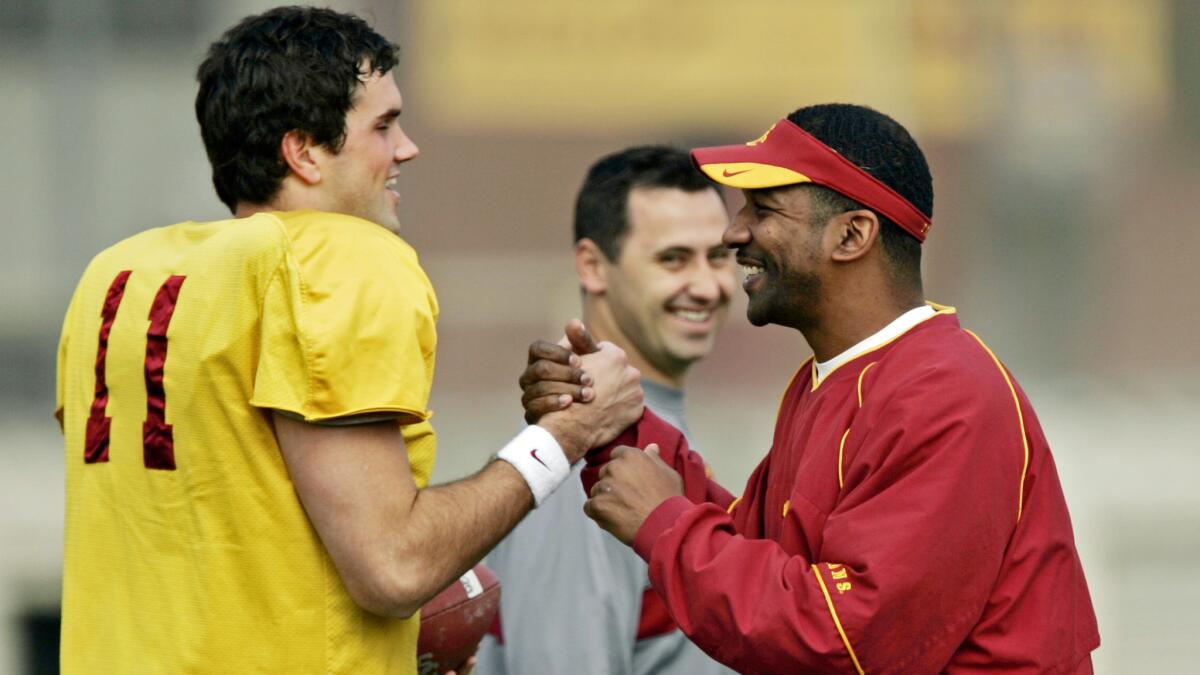Ex-USC assistant Todd McNair seeks vindication from Reggie Bush saga

- Share via
Todd McNair is not coaching college or pro football, but the former USC assistant is trying to keep his hand in the sport.
As the defamation lawsuit he filed against the NCAA three years ago makes its way through the court system, McNair is drawing up plays and drills as a volunteer coach for his son’s youth football team in Pasadena.
McNair, 48, has not worked since the 2009 season. USC did not renew his contract in July 2010, a month after the NCAA imposed penalties for violations that occurred when running back Reggie Bush played for the Trojans.
McNair, who worked at USC under former coach Pete Carroll from 2004 to 2009, was a key figure in the NCAA’s investigation into allegations that Bush and his family received cash and other prohibited benefits while Bush was playing for the Trojans.
McNair was not named in the NCAA infractions report but he was the assistant coach the NCAA determined “knew or should have known” that Bush had dealings with two sports marketers from the San Diego area, Lloyd Lake and Michael Michaels.
The NCAA also determined that McNair had engaged in unethical conduct and sanctioned him with a “show-cause” order, preventing him from contact with recruits for one year while working for USC or any other NCAA-member institution. The order makes a coach essentially unemployable.
In April 2011, the NCAA denied McNair’s appeal to overturn its findings and penalties.
McNair’s attorney, Scott Tompsett, said in a statement after the ruling that the infractions committee “mischaracterized and manipulated key testimony.” McNair sued the NCAA for unspecified damages in June 2011, citing irreparable damage to his career.
In November 2012, Los Angeles Superior Court Judge Frederick Shaller ruled against the NCAA’s motions to dismiss the case and to keep documents under seal. McNair had shown a “probability of prevailing on the defamation claims,” Shaller wrote.
Shaller wrote that emails between an infractions committee member, an NCAA employee and an NCAA appeals coordinator “tend to show ill will or hatred.” Schaller said in court that “the conduct that is shown by the persons involved in this investigation is over the top, it’s malicious, and I think it was directed for an outcome.”
McNair and his attorneys declined to comment for this story. The NCAA also declined to comment.
Michael McCann, a professor at the University of New Hampshire School of Law, said McNair has “gotten by one benchmark” and that it was “significant.”
“It doesn’t mean he’s going to win the case,” McCann said, “but it signals to the NCAA that this is not going away.”
The NCAA appealed Shaller’s decision and the case is set to go before the California Court of Appeal.
The Los Angeles Times and the New York Times filed an application with the appellate court to unseal the NCAA documents, which if granted, McCann said, could expose more embarrassing and potentially damaging revelations.
“The NCAA now has incentive to settle the case,” McCann said.
More to Read
Fight on! Are you a true Trojans fan?
Get our Times of Troy newsletter for USC insights, news and much more.
You may occasionally receive promotional content from the Los Angeles Times.







